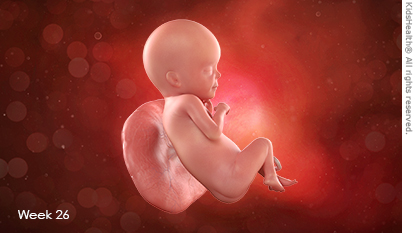- Home
- Humana Medicaid
- Kentucky Medicaid
- Medicaid extras
- Health and wellness
- Parents Home
- Para Padres
- A to Z Dictionary
- Allergy Center
- Asthma
- Cancer
- Diabetes
- Diseases & Conditions
- Doctors & Hospitals
- Emotions & Behavior
- First Aid & Safety
- Flu (Influenza)
- Food Allergies
- General Health
- Growth & Development
- Heart Health & Conditions
- Homework Help Center
- Infections
- Newborn Care
- Nutrition & Fitness
- Play & Learn
- Pregnancy Center
- Preventing Premature Birth
- Q&A
- School & Family Life
- Sports Medicine
- Teens Home
- Para Adolescentes
- Asthma
- Be Your Best Self
- Body & Skin Care
- Cancer
- Diabetes
- Diseases & Conditions
- Drugs & Alcohol
- Flu (Influenza)
- Homework Help
- Infections
- Managing Your Weight
- Medical Care 101
- Mental Health
- Nutrition & Fitness
- Q&A
- Safety & First Aid
- School, Jobs, & Friends
- Sexual Health
- Sports Medicine
- Stress & Coping
Pregnancy Calendar: Week 26
Your Baby's Development
Your baby's eyes have been sealed shut for the last few months, but they'll soon open and begin to blink. Depending on ethnicity, some babies will be born with blue or gray-blue eyes (which may change color in the first year of life) and some will be born with brown or dark eyes.  Eyelashes are growing in, as is more hair on the head.
Eyelashes are growing in, as is more hair on the head.
Your baby, weighing a little less than 2 pounds (907 grams), still looks wrinkly but will continue to gain weight steadily over the next 14 weeks until birth.

Your Body
 Your uterus provides a safe haven for your baby before birth. But what about after delivery? Your baby will be moving about your home in what seems like no time at all. Take the time now to safeguard your home by babyproofing. Covering electrical outlets, removing choking hazards, installing smoke alarms, and blocking off staircases are just some of the steps to ensuring your child's safety. Take every precaution you can think of, but remember: No amount of babyproofing can substitute for careful supervision of your child.
Your uterus provides a safe haven for your baby before birth. But what about after delivery? Your baby will be moving about your home in what seems like no time at all. Take the time now to safeguard your home by babyproofing. Covering electrical outlets, removing choking hazards, installing smoke alarms, and blocking off staircases are just some of the steps to ensuring your child's safety. Take every precaution you can think of, but remember: No amount of babyproofing can substitute for careful supervision of your child.

© 1995- The Nemours Foundation. KidsHealth® is a registered trademark of The Nemours Foundation. All rights reserved.
Images sourced by The Nemours Foundation and Getty Images.